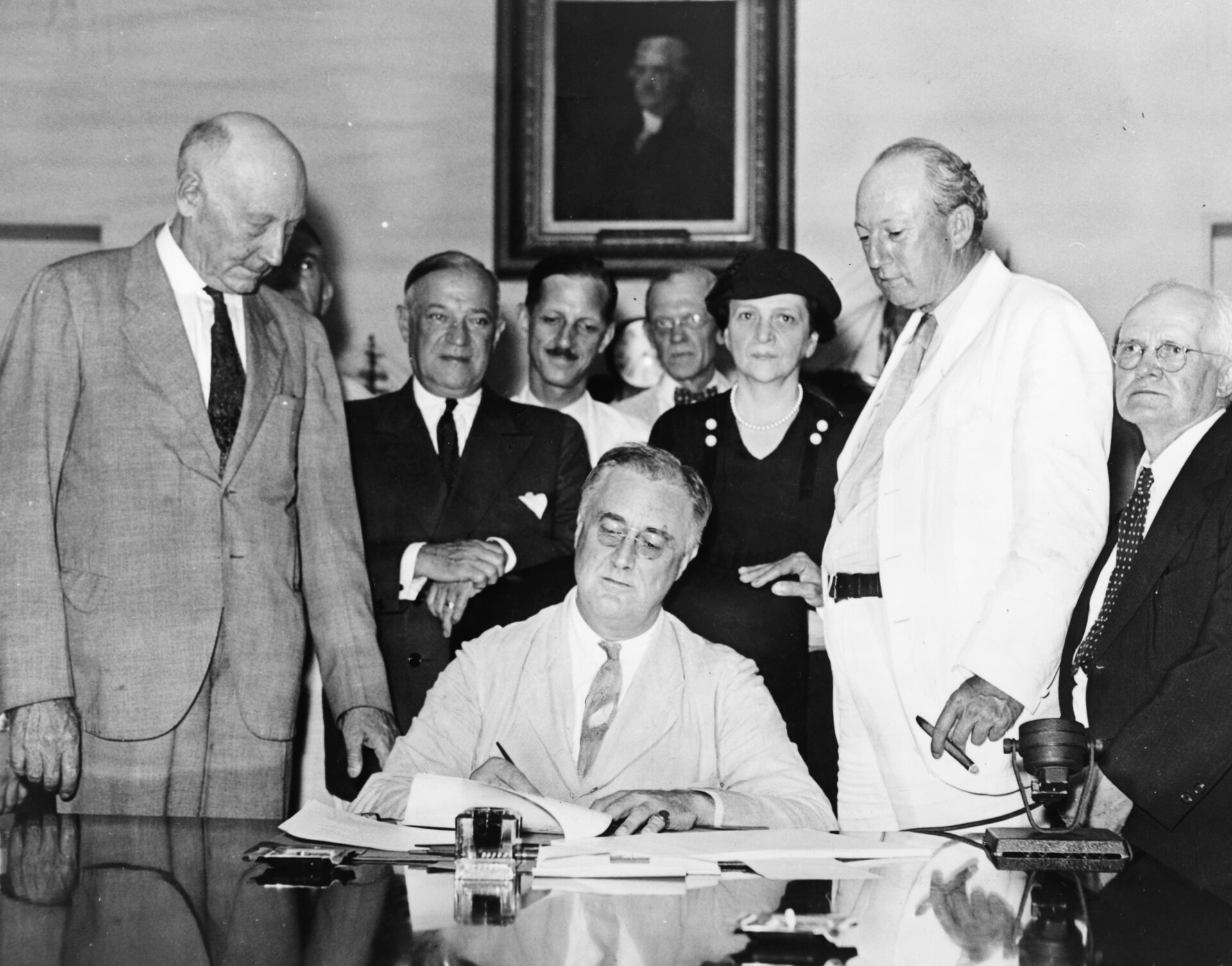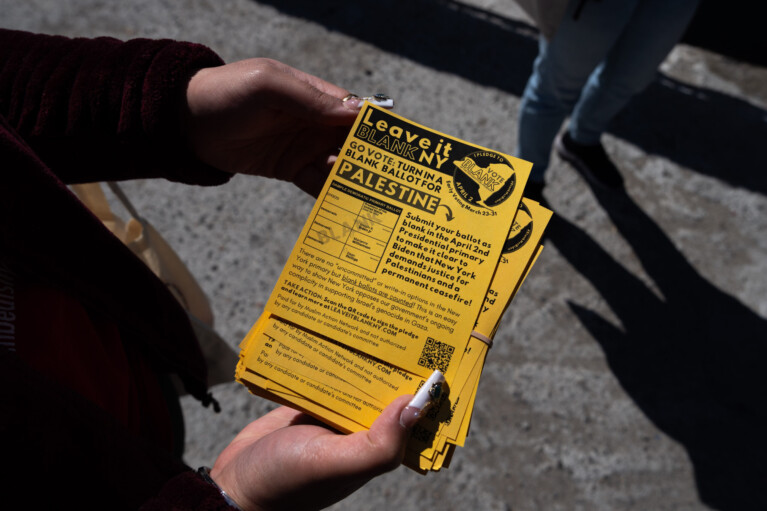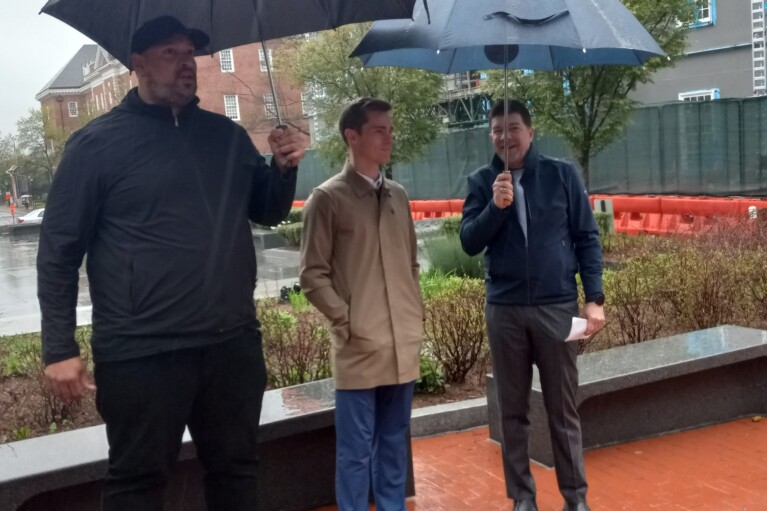Frank DeFilippo: A Marylander’s Role in Crafting Social Security

There’s an important anniversary on Aug. 15 that’s worth nearly a trillion dollars.
When David J. Lewis, Republican turned Democrat, congressman from Western Maryland, co-authored the Social Security Act in 1935, he could not have foreseen how his former party, 84 years later, would belittle and bemoan the senior citizens’ lifeline to old age without poverty.
Lewis was converted, at an early age, from his family’s tradition of Republicanism by a William Jennings Bryan speech, to become a Democratic cheerleader for the New Deal and a favorite of President Franklin Delano Roosevelt. He is buried at Hillcrest Cemetery, in Cumberland, Md., nearby the coal mines where he began working at age eight.
As Social Security approaches its 84th birthday – the Aug. 15 date when FDR signed the Act into law and legend – not many people outside the far reaches of Western Maryland are aware that the program, now considered a bedrock entitlement right up there with life, liberty and the pursuit of happiness, had its origins in the coal fields where Lewis, an illiterate son of Welsh immigrants, began studying Latin and reading the law in his spare time while he worked in the mines to help his family.
He passed the bar in 1892 and hung his shingle in Cumberland. Lewis went on to serve one term in the Maryland Senate, seven staggered terms in Congress and eight years as a member of the U.S. Tariff Commission. He ran for the U.S. Senate several times and came close but never won. Talk about the American Dream.
Today, 67 million people collect Social Security benefits in one form or another, including 763,000 in Maryland – that’s one in seven Marylanders – many of whom could be a monthly check away from sleeping under a bridge or eating canned dog food. Social Security pumped a total of $12.8 billion into Maryland’s economy last year, and this year the figure will increase because of a cost of living adjustment.

Frank A. DeFilippo
Last year, the Social Security fund paid out nearly a trillion dollars to recipients at home and abroad, almost all (94 percent) of the $996.6 billion it collected from active income earners. Social Security is a self -sustaining pay-as-you-go system.
Social Security is widely misunderstood. It includes not only 42 million retirees, but also pays out to 6 million survivors, 3.7 million aged widows, 1.8 million children of parents with disabilities, 3 million children under 18 and 1.1 million disabled persons, and then some.
And there’s the rub for the stingy some who view Social Security as a massive transfer of wealth from the young and productive to the aged and nonproductive.
But look at Social Security as money in motion, which is what economics is all about. It’s nearly a trillion dollars that is being re-circulated through the economy because most recipients need the money to survive and they spend it on essential needs such as food, rent and other necessities. The money-in, money-out fund is not idle cash sitting in a Wall Street hedge fund or Bolivian tin mine stock. Nor is it packaged and sold as derivatives or invested in stock buy-backs, as some Republicans wish.
Over the years, and still making conservative GOP (an admitted redundancy) hearts go pitter-patter is the idea of privatization and free-market kleptocracy, or, put another way, picking pockets of the poor to enrich the Hamptons crowd.
That was the dim flicker of an Ayn Rand-induced dream of former U.S. House speaker Paul Ryan, of Wisconsin, who entertained dismantling Social Security as it now exists to create individual accounts, such as IRAs, and turn over nearly a trillion dollars a year to Wall Street money managers. Ditto Medicare, the companion health care program, which routinely comes under siege for conversion to a voucher system. Or, in another view, creating a version of Medicare-for-all system that obliterates – or some renditions would include – private insurance.
Often there is talk, too, of cutting benefits to stabilize the system, which, the pencilnecks theorize will go broke by 2037, or some other evanescent date, without a long-term fix. This could come, for example, in the form of actually cutting the payouts, raising the taxable amount of income or bumping up the retirement age (usually considered 65, but actually depends on when a person was born).
There are warning signs that a recession is coming, precipitated by President Trump’s currency and trade wars, teetering bond and stock markets, his hectoring of the Federal Reserve as well as Wall Street’s proof that it learned nothing from the economy’s 2008 collapse. Markets are not comfortable with uncertainty. Imagine, if you can, that Wall Street had been in charge of Social Security back then.
Individual Social Security accounts would have been plundered and packaged as worthless derivatives, pretty much the way sub-prime mortgages took down the world economy. And, as every amateur economist knows, the government had to rush in and bail out Wall Street and the banking industry while not a single malefactor was prosecuted, but, in fact, paid themselves bonuses with taxpayers’ bailout funds. And now, Wall Street is back in the derivatives business, only this time with stock buybacks, student loans and whatever else carries a dollar-sign imprint.
If Social Security were privatized and the markets collapsed, the streets of America would resemble the public spaces of Hong Kong and Paris, only worse: While protesters in Europe and elsewhere wear yellow jackets and brandish axe handles and rocks, there are nearly 400 million guns in America and quite a few nuts who own them.
So Davey Lewis, as he was called, must be spluttering in his Western Maryland grave over the mere mention of tampering with the landmark safety net program.
To put Lewis in context, during his time, Western Maryland was one of the most liberal areas of the state, mainly because of the organized presence of the railroad and miners’ unions.
It eventually became the 6th Congressional District, which then included all of Montgomery County and now is a redistricted salad-bar special. And along with Lewis, the area and the district produced liberal Republicans such as Charles McC. Mathias Jr., J. Glenn Beall senior and junior – all members of the U.S. Senate and/or House of Representatives and the Maryland General Assembly.
As chairman of the House Labor Committee, Lewis sponsored not only the Social Security system as well as the Parcel Post system. But he led the fight on the social front as well – mine safety inspection, compulsory education for every child, child labor laws and for the direct primary election system that we now have. And he fought to legalize the right of working people to strike for decent wages and working conditions.
There’s an interesting twist to Lewis’ rise from illiteracy to congressional conscience on social issues. As a member of the House Ways and Means Committee, he co-sponsored the Social Security Act along with Sen. Robert Wagner of New York.
Lewis’ committee chairman, Rep. Robert Doughton (D-N.C.), was so enamored of the legislation that he copied it and inveigled the House clerk to assign him a lower number, which allowed him to claim prior sponsorship.
Lewis was furious. He was determined to become the leading House expert on Social Security. When the bill came up for consideration, Lewis strode down the aisle to the House well to the applause of his colleagues, a tribute to Lewis and an audible rebuke of Doughton.
Happy Anniversary Social Security, and RIP Davey Lewis, for a job well done – by the son of immigrants.




 Creative Commons Attribution
Creative Commons Attribution